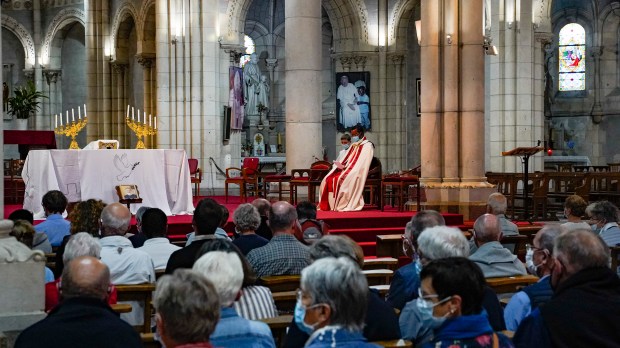In an interview with Le Figaro, Rémi Brague, the French Catholic philosopher, reflected on the murder of Fr. Olivier Maire, the priest who was killed by a Rwandan immigrant. What he had to say addresses what it means to be a Christian.
On the face of it, the priest’s murder appears avoidable — that is the assumption made by Brague’s interviewer and perhaps held by most people. The suspect was a known arsonist who had confessed to setting the Nantes Cathedral on fire last July. In spite of this, Fr. Maire had hosted him in his Montfortian community for the last year.
When asked how he feels about Fr. Maire’s murder, Brague rued the “collapse of our institutions” that allowed such a person to remain in France after committing arson, and wonders why the suspect could not have been placed in an institution to offer him the care — and surveillance — he needed.
However, he also deemed the politicization of the crime as “inappropriate.” What follows is a beautiful expression of the meaning of true Christian love.
When asked whether Fr. Maire was “blinded by his goodness” and missed the warning signs that should have convinced him not to take the man in, Brague said:
“Goodness never blinds people. On the contrary, it opens their eyes. ‘Love is blind’ is universal folk wisdom, but when you get down to it, it’s not very wise. The proverb is true only if by ‘love’ you mean an all-consuming passion that ultimately loves its object only for the pleasure it draws from it, and therefore doesn’t really love anything but itself.
“True love enlarges and deepens our understanding. From the beginning, faith has helped Christians to see as full human beings those whom others were able to see, at best, as partly human: slaves, women, the unborn, the dying pagans …
“Good people want what is best, for themselves as well as for others, and are sometimes even capable of putting the good of others before their own. Goodness means learning to recognize a capacity for doing good even among people who seem incapable of it. It means giving a chance to someone who might not deserve it. That means taking risks, sometimes big risks. Everything we know leads us to believe that Father Maire knew this. He was a member of a missionary congregation, that is, used to living in inhospitable regions — sometimes even hostile ones. He was animated by the conviction that all human beings are worthy of the message of truth that he was carrying.”
Fr. Maire lost his life living out his faith, but, Brague, cautions, this does not mean it is right for one person to urge others to risk their lives.
“‘Turn the other cheek’ is wonderful as long as it means my own cheek. But urging my neighbor to do it, while I am at no risk myself, is ignoble,” he said.
Therefore, it is “one of the essential missions of the state,” he said to protect its citizens from violence.
“Should it fail to protect its citizens, its legitimacy is gone,” said Brague.


